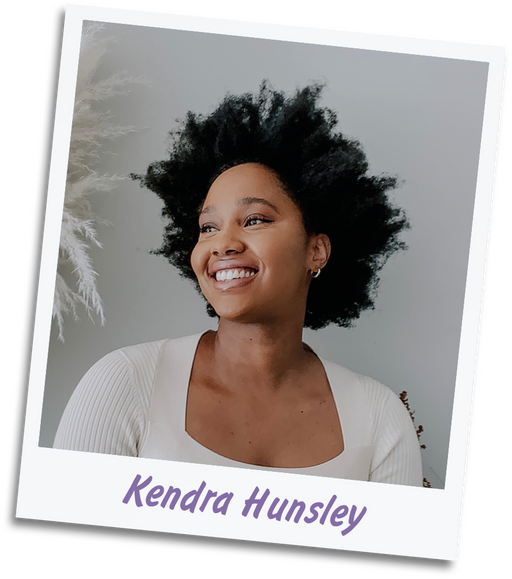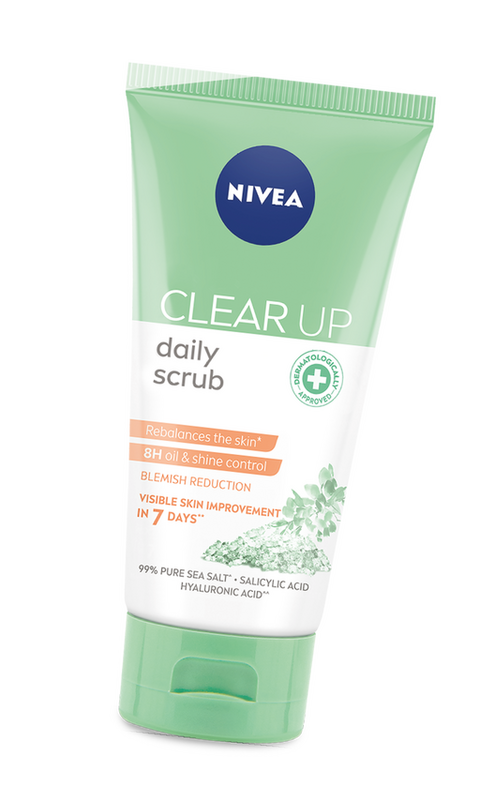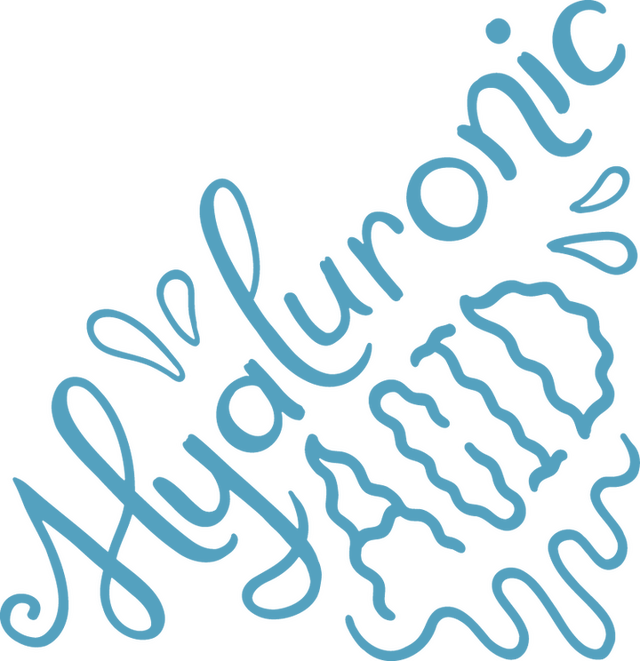

How I learnt
to embrace
and manage my pimple-prone skin



Learning how to love your skin while managing your breakouts is something that’s an ongoing journey, and there’s no one better to give us a bit of insight into that than Kendra Hunsley. A consumer and trends analyst by profession but a lifestyle and beauty content creator at her core, Kendra is in her early 30s yet still battles with breakouts that try to get in the way of her confidence. We got to chat to her about her skincare story and how she managed to find her feet in the busy world of skincare buzzwords.
Q
When did you realise that your skin was blemish-prone?
A
I had a very rude awakening a few years ago, around the age of 26, when I experienced the worst pimple breakout of my life. It was so confusing to me because, at the time, I didn’t really know much about adult breakouts. Since then, I’ve had to switch up my skincare routine and tailor it to my skin. It was a huge adjustment, but I like to think that I am now more educated on what works for my skin and what doesn’t.
Q
How did the relationship with your skin change as you grew up? And now, as someone in her early 30s who still experiences breakouts, how is your attitude towards them?
A
To be completely honest, my self-confidence has taken a knock due to having pimple-prone skin in my adult years, especially when I have a breakout. So, I really do appreciate the self-love rhetoric, especially in the age of social media. However, we also can’t ignore the huge effect that the state of your skin has on your self-confidence. As a content creator who finds herself constantly in front of the camera, the way my skin
Learning how to love your skin while managing your breakouts is something that’s an ongoing journey, and there’s no one better to give us a bit of insight into that than Kendra Hunsley. A consumer and trends analyst by profession but a lifestyle and beauty content creator at her core, Kendra is in her early 30s yet still battles with breakouts that try to get in the way of her confidence. We got to chat to her about her skincare story and how she managed to find her feet in the busy world of skincare buzzwords.
Q
When did you realise that your skin was blemish-prone?
A
I had a very rude awakening a few years ago, around the age of 26, when I experienced the worst pimple breakout of my life. It was so confusing to me because, at the time, I didn’t really know much about adult breakouts. Since then, I’ve had to switch up my skincare routine and tailor it to my skin. It was a huge adjustment, but I like to think that I am now more educated on what works for my skin and what doesn’t.
Q
How did the relationship with your skin change as you grew up? And now, as someone in her early 30s who still experiences breakouts, how is your attitude towards them?
A
To be completely honest, my self-confidence has taken a knock due to having pimple-prone skin in my adult years, especially when I have a breakout. So, I really do appreciate the self-love rhetoric, especially in the age of social media. However, we also can’t ignore the huge effect that the state of your skin has on your self-confidence. As a content creator who finds herself constantly in front of the camera, the way my skin This winning combo, which features in the NIVEA Clear Up range, works together to bust blemishes, prevent and soothe irritation and keep skin clear and hydrated all day, every day.
looks matters to me. I don’t really want to take [photographs for my] content when I am experiencing a breakout, but I have to remind myself that it is also important to show up as my authentic self. I really don’t owe anyone clear skin, and there are so many people who have blemish-prone skin. It is a normal part of life.
As a content creator who finds herself constantly in front of the camera, the way my skin looks matters to me. I don’t really want to take [photographs for my] content when I am experiencing a breakout, but I have to remind myself that it is also important to show up as my authentic self. I really don’t owe anyone clear skin, and there are so many people who have blemish-prone skin. It is a normal part of life.
Q
What were some of the best and worst at-home remedies you tried?
A
Oh, my goodness! I went through an all-natural skincare phase. To be fair, there isn’t anything wrong with these products, and many people have seen favourable results from them. However, I didn’t exercise due diligence in understanding the ingredients and why I was using those products in the first place. As someone with blemish-prone skin, it is important to use ingredients that are non-comedogenic. I didn’t have that education then, so I was putting all these oils on my face. I used to do DIY masks at home, the turmeric, honey and lemon mask specifically. Now I focus more on scientifically proven ingredients as I feel these work best for my skin.
Q
What are some of the game-changing ingredients you’ve been exposed to?
A
So many. I really take the time to educate myself on skincare ingredients. I’ve learnt the importance of hydration for all skin types. My favourite ingredients for my blemish-prone skin are salicylic acid, retinol, azelaic acid and hyaluronic acid, to name a few. And the most important product of all? Sunscreen! It is non-negotiable and should be a part of everyone’s skincare routine.

Interview: Foyin Ogunrombi

Is hyaluronic acid good for




Hyaluronic acid is a buzzword in the beauty world that you’ve probably heard of before, but I’m sure you haven’t heard of it in the context of pimple treatment and prevention. People tend to believe that if you have spot-prone skin, you need to avoid hydrators and moisturisers because they’re going to make your skin greasy and cause you to break out even more. But what if I told you that this may not be true? And before you become sceptical, like they say on TikTok, you’re going to have to let me cook.
What is hyaluronic
acid?
Hyaluronic acid is a naturally occurring substance in your body that helps retain moisture in your skin, eyes and joints. Unfortunately, over time and because of environmental factors, our body’s production of it decreases, which means we lose our ability to retain as much moisture as before in areas like our skin. Why do we want more hyaluronic acid? Because this fancy molecule attracts and binds to water, being able to absorb more than 1,000 times its own weight, making it a key player in battling dehydrated skin. And it’s very important that we don’t confuse dehydrated skin with dry skin, because even oily skin can be dehydrated.
THE PIMPLE-SOOTHING DYNAMIC DUO: HYALURONIC ACID AND SALICYLIC ACID
We already know that hyaluronic acid hydrates your skin and helps regulate sebum production, but did you know that salicylic acid is a great chemical exfoliant that can detox your clogged pores? Now imagine using these baddies together: keeping your pores clear, managing how much oil you do produce and making sure your skin is adequately hydrated. I’d say it’s a match made in heaven – and you can find both in the NIVEA Clear Up Deep Pore Cleanser, Daily Scrub and Blemish Gel!
Why does
dehydration
matter?
When your skin is dehydrated, your body produces an excess amount of sebum, which is essentially oil that clogs your pores. You see where I’m going with this? If your skin is producing a lot of oil, you may think that “drying it out” by not using a lot of skincare products will decrease the oil production. In fact, it’s the complete opposite. When your skin is dehydrated, your oil production increases even more, causing more oil to be produced, which leads to more breakouts – and so the cycle continues.
So what are we going
to do about it?
It isn’t enough to simply drink your water. If your skin is really dehydrated, you may need help in the form of topical hyaluronic acid, which can also be found in the NIVEA Clear Up range, BTW. Not only does hyaluronic acid hydrate skin, which in turn controls sebum production and ensures you break the cycle of breakouts, it also has anti-inflammatory
properties that reduce irritation and
redness. Hyaluronic acid also
helps plump and smooth your skin and
aids with collagen production
and skin barrier protection,
all of which work to
increase your skin’s
health over time,
subsequently
decreasing the
appearance of
pimple
scarring.
It isn’t enough to simply drink your water. If your skin is really dehydrated, you may need help in the form of topical hyaluronic acid, which can also be found in the NIVEA Clear Up range, BTW. Not only does hyaluronic acid hydrate skin, which in turn controls sebum production and ensures you break the cycle of breakouts, it also has anti-inflammatory properties that reduce irritation and redness.
Hyaluronic acid also helps plump and
smooth your skin and aids with
collagen production and
skin barrier protection,
all of which work to
increase your skin’s
health over time,
subsequently
decreasing the
appearance of
pimple
scarring.
Sources: www.100percentpure.com/blogs/feed/should-you-be-using-hyaluronic-acid-for-acne, www.healthline.com/health/beauty-skin-care/hyaluronic-acid-for-acne#other-skin-care-benefits, www.everydayhealth.com/skin-beauty/hyaluronic-acid-definition-benefits-and-the-best-serums/, myeclatshop.com/blogs/the-eclat-edit/hyaluronic-acid-vs-salicylic-acid#?region=1


